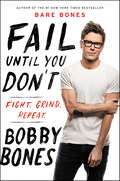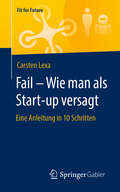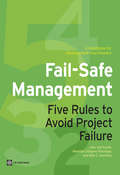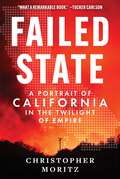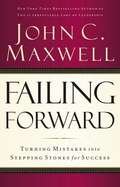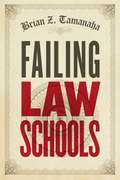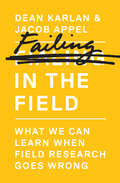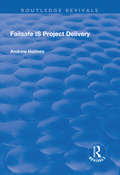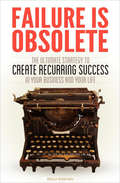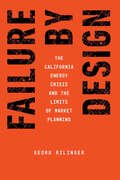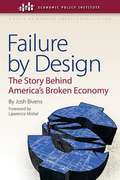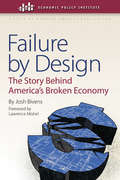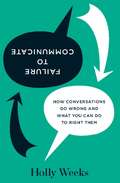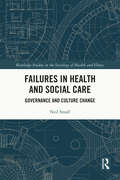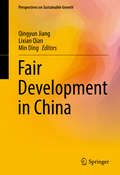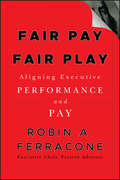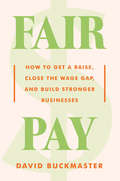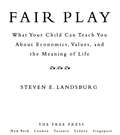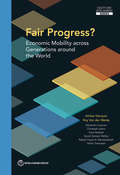- Table View
- List View
Fail Until You Don't: Fight Grind Repeat
by Bobby Bones#1 New York Times BestsellerThe #1 New York Times bestselling author of Bare Bones, host of the marquee morning program “The Bobby Bones Show,” comedian and dedicated philanthropist delivers an inspirational and humorous collection of stories about his biggest misses in life and how he turned them into lessons and wins. Bobby Bones is the youngest inductee ever into the National Radio Hall of Fame alongside legends Dick Clark, Larry King, and Howard Stern. As "the most powerful man in country music" (Forbes), he has reached the peak of his profession and achieved his childhood dreams. Each weekday morning, more than five million fans tune in to his radio show. But as Bobby reveals, a lot of what made him able to achieve his goals were mistakes, awkward moments, and embarrassing situations—lemons that he turned into lemonade through hard work and humility. In this eye-opening book, he’ll include ideas and motivations for finding success even when seemingly surrounded by impossible odds or tough failures. He also includes anecdotes from some of his famous friends—Andy Roddick, Chris Stapleton, Charlamagne Tha God, Charles Esten, Brooklyn Decker, Walker Hayes and Asa Hutchinson—who open up about their own missteps. Bobby’s mantra is Fight. Grind. Repeat. A man who refuses to give up, he sees failure as something to learn from—and the recollections in this funny, smart book, full of Bobby’s brand of self-effacing humor, show how he’s become such a beloved goofball.
Fail – Wie man als Start-up versagt: Eine Anleitung in 10 Schritten (Fit for Future)
by Carsten LexaSieben von zehn Startups scheitern. Die Gründe sind bekannt. Aber warum wird das Scheitern nicht mit der notwendigen Gründlichkeit durchgeführt? Dieses Buch verfolgt einen neuen Ansatz zum Thema „Unternehmensgründungen“. Aufgebaut als „Anleitung zum Fehlschlag“ werden zehn typische Themenkomplexe dargestellt und mit Beispielen aus der Praxis angereichert, in denen Gründer Fehler machen, die sich später als fatal für junge Unternehmen herausstellen. Wer auf der Suche ist nach einem Ratgeber, um sein Unternehmen erfolgreich "an die Wand zu fahren", bekommt mit diesem Buch das notwendige Rüstzeug - und lernt, was wirklich wichtig ist.
Fail-Safe Management: Five Rules to Avoid Project Failure
by Jody Zall Kusek Marelize Goergens Prestidge Billy C. HamiltonThe decision to look at failures for answers is a bold one. Policy makers, planners and implementers have a tendency to look through prisms of success in framing working policies, programs and results when justifying them. Despite this, we still tend to address failures indirectly by looking at risk, critical success factors, unintended outcomes or consequences, and negative impacts to name a few. As the authors say, 'while success is desirable and we plan for it, failures are inevitable and we seldom plan to mitigate them. 'The authors have clearly emphasized the need to look at failures in an integrated manner by building them into the planning and budget process while at the same time identifying monitoring points for early detection that will provide critical information for timely intervention. Failures are real, and we must plan to face them when they emerge. This book will offer the necessary insight to managers. - Koshy Thomas, Head of the Outcome-based Budgeting Project Team, Ministry of Finance, MalaysiaThis book provides invaluable guidance on how to avoid the failure of interventions, whether for projects, programs, or policies. The authors note that although good design is essential, 'paying attention to details that only happen during implementation is essential in avoiding failure'. The five steps outlined are salutary, and point to the craft needed for good implementation-the range of issues which have continuously to be managed, the environment, stakeholders, resources, systems, and so on. As the authors point out, some elements are beyond the control of a project manager, but all too often it is the things that are controllable that are ignored at our peril. Good management is not sexy, but it usually makes thedifference between failure and success. This book deserves careful study by public and private sector managers and implementers. - Dr. Ian Goldman, Head of Evaluation and Research, Department of Performance Monitoring and Evaluation, The Presidency, South AfricaFail-Safe Management provides much needed guidance aimed at preventing failure in program implementation. Considerable resources and effort are traditionally invested in the development and scientific evaluation of program interventions. Despite the availability of efficaciousinterventions, population-level programmatic impact is difficult to achieve. The gap between the availability of scientifically developed efficacious interventions and the scarcity of population-level programmatic impact is often attributable to inadequate strategic planning and implementation failures. This book promises to be of great help to program managers in avoiding the latter. - Dr Sevgi Aral, Associate Director for Science, Division of STD Prevention, U. S. Centers for Disease Control and Prevention (CDC)During the discussions on the Lagos Plan of Action, the late President of The United Republic of Tanzania, Mwalimu Julius Nyerere asked, 'why projects in Africa failed and what can be done to rescue the situation'. The answer was that projects failed because of corruption and greed, and the solution suggested was to set up anti-corruption commissions to root out corrupt practices. Decades later the problem remains. What then is the problem? This book sheds light on why projects fail and provides a critical path on 'how to avoid failure' while addressing inevitable development problems. It outlines five simple steps-that are not rocket science-for development practitioners to understand and apply. Perhaps this book should have written at the time of Mwalimu Julius Nyerere and the Lagos Plan of Action. He would have found the right answers in it. - Dr. Simon Muchiru, Director, Oakwood and Associates Consultants, Gaborone, Botswana
Failed Democracies in Latin America and the Caribbean: Democratic Purgatory and the Viability of Consolidated Democratic Regimes
by Christopher M. BrownThis book addresses the breakdown of failed democratic systems in Latin America and the Caribbean. The scope of this investigation is a study of political systems of Venezuela, Colombia, and Nicaragua. The implications of the present research on democratic purgatory have real-world applications not only for the above countries but also for those political systems that are currently transitioning and/or consolidating their democracies as well.
Failed State: A Portrait of California in the Twilight of Empire
by Christopher MoritzCalifornia was once the crown jewel of the American dream: prosperous, innovative, egalitarian, and aspirational. Today, it stands as a dystopian warning of what happens when nihilistic, radical ideology consumes the foundations of governance. In Failed State, Christopher Moritz dissects the unraveling of the Golden State with the precision of a lawyer, the depth of a historian, and the heartbreak of a California native son who has witnessed its collapse firsthand. Through disturbing, relentless detail drawn from whistleblowers, law enforcement insiders, and classified reports, he exposes the corrosive and deadly impact of progressive policies that have prioritized criminals over victims, cartels over citizens, and ideological dogma over law and order. Moritz reveals the architects of this catastrophe: rogue prosecutors bankrolled by anarchist billionaires, open-border zealots who have transformed California into a cartel haven, and policymakers who have gutted public safety in the name of equity. The 2025 Palisades Fire, a man-made disaster, epitomize this descent into chaos. Fire hydrants ran dry while organized looters turned evacuation zones into war zones. Resources were squandered on symbolic virtue-signaling as ordinary citizens were left defenseless in the face of destruction. These failures are not isolated—they are the inevitable result of policies designed to dismantle civic order and empower anarchic forces at the expense of law-abiding Americans. Yet, Failed State is more than an autopsy of California&’s collapse. Drawing on historical parallels—from the Bolshevik Revolution&’s destruction of Christian Russia to the ethnic cleansing of Rhodesia by Mugabe&’s communists—Moritz warns that California&’s crisis is not contained to the Golden State. It is a harbinger for America&’s future if these radical trends metastasize nationwide. His searing analysis reveals the systematic dismantling of civil society and the betrayal of a state&’s duty to its citizens, all in service of an anti-civilization agenda cloaked in the language of progress. Unflinching, provocative, and unapologetically honest, Failed State is a rallying cry for those who refuse to stand by as America&’s most prosperous state spirals into lawlessness and disorder. For those seeking clarity amid chaos, Christopher Moritz delivers a blistering indictment of failed leadership and a warning that the unraveling of California could signal that unraveling of the nation itself.
Failing Forward: Turning Mistakes into Stepping Stones for Success
by John MaxwellThe major difference between achieving people and average people is their perception of and response to failure. John C. Maxwell takes a closer look at failure-and reveals that the secret of moving beyond failure is to use it as a lesson and a stepping-stone. He covers the top reasons people fail and shows how to master fear instead of being mastered by it. Readers will discover that positive benefits can accompany negative experiences-if you have the right attitude. Chock full of action suggestions and real-life stores, Failing Forward is a strategic guide that will help men and women move beyond mistakes to fulfill their potential and achieve success.
Failing Law Schools
by Brian Z. TamanahaOn the surface, law schools today are thriving. Enrollments are on the rise, and their resources are often the envy of every other university department. Law professors are among the highest paid and play key roles as public intellectuals, advisers, and government officials. Yet behind the flourishing facade, law schools are failing abjectly. Recent front-page stories have detailed widespread dubious practices, including false reporting of LSAT and GPA scores, misleading placement reports, and the fundamental failure to prepare graduates to enter the profession. Addressing all these problems and more in a ringing critique is renowned legal scholar Brian Z. Tamanaha. Piece by piece, Tamanaha lays out the how and why of the crisis and the likely consequences if the current trend continues. The out-of-pocket cost of obtaining a law degree at many schools now approaches $200,000. The average law school graduate's debt is around $100,000--the highest it has ever been--while the legal job market is the worst in decades, with the scarce jobs offering starting salaries well below what is needed to handle such a debt load. At the heart of the problem, Tamanaha argues, are the economic demands and competitive pressures on law schools--driven by competition over U. S. News and World Report ranking. When paired with a lack of regulatory oversight, the work environment of professors, the limited information available to prospective students, and loan-based tuition financing, the result is a system that is fundamentally unsustainable. Growing concern with the crisis in legal education has led to high-profile coverage in the Wall Street Journal and the New York Times, and many observers expect it soon will be the focus of congressional scrutiny. Bringing to the table his years of experience from within the legal academy, Tamanaha has provided the perfect resource for assessing what's wrong with law schools and figuring out how to fix them.
Failing in the Field: What We Can Learn When Field Research Goes Wrong
by Dean Karlan Jacob AppelAll across the social sciences, from development economics to political science departments, researchers are going into the field to collect data and learn about the world. While much has been gained from the successes of randomized controlled trials, stories of failed projects often do not get told. In Failing in the Field, Dean Karlan and Jacob Appel delve into the common causes of failure in field research, so that researchers might avoid similar pitfalls in future work. Drawing on the experiences of top social scientists working in developing countries, this book delves into failed projects and helps guide practitioners as they embark on their research. From experimental design and implementation to analysis and partnership agreements, Karlan and Appel show that there are important lessons to be learned from failures at every stage. They describe five common categories of failures, review six case studies in detail, and conclude with some reflections on best (and worst) practices for designing and running field projects, with an emphasis on randomized controlled trials. There is much to be gained from investigating what has previously not worked, from misunderstandings by staff to errors in data collection.Cracking open the taboo subject of the stumbles that can take place in the implementation of research studies, Failing in the Field is a valuable "how-not-to" handbook for conducting fieldwork and running randomized controlled trials in development settings.
Failsafe IS Project Delivery (Routledge Revivals)
by Andrew HolmesThis title was first published in 2001. Based on research and practical experience, this text highlights the contributory factors leading to project failure. The buisiness-IT culture gap, information politics, escalating commitment, the problem of high investment and low return, and accountability for failure are all covered.
Failure Is Obsolete: The Ultimate Strategy to Create Recurring Success in Your Business and Your Life
by Benji RabhanA data-driven way to make smarter decisions every day: &“One of the smartest conversion guys I know&” (Perry Marshall, author of The Ultimate Guide to Google AdWords). Failure Is Obsolete reveals an easy-to-use formula for testing high-risk ideas in a low-risk environment, providing increased likelihood of success before you waste a lot of time and money moving in the wrong direction. Be more confident in your business decisions—from creating new products to hiring employees and launching new marketing campaigns—as well as personal decisions like dating or choosing a retirement home. This useful strategy evolves from the author&’s years of experience in conversion rate optimization, helping companies improve their websites and marketing funnels so they make more money. In addition, Failure Is Obsolete reveals some of Benji Rabhan&’s best conversion techniques that readers can use on their own websites.
Failure by Design: The California Energy Crisis and the Limits of Market Planning
by Georg RilingerA new framework for studying markets as the product of organizational planning and understanding the practical limits of market design. The Western energy crisis was one of the great financial disasters of the past century. The crisis began in April 2000, when price spikes started to rattle California’s electricity markets. Decades later, some blame economic fundamentals and ignorant politicians, while others accuse the energy sellers who raided the markets. In Failure by Design, sociologist Georg Rilinger offers a different explanation, one that focuses on the practical challenges of market design. The unique physical attributes of electricity made it exceedingly difficult to introduce markets into the coordination of the electricity system, so market designers were brought in to construct the infrastructures that coordinate how market participants interact. An exercise in social engineering, these infrastructures were intended to guide market actors toward behavior that would produce optimal market results and facilitate grid management. Yet, though these experts spent their days worrying about incentive misalignment and market manipulation, they unintentionally created a system riddled with opportunities for destructive behavior. Rilinger’s analysis not only illuminates the California energy crisis but also develops a broader theoretical framework for thinking about markets as the products of organizational planning and the limits of social engineering, contributing broadly to sociological and economic thinking about the nature of markets.
Failure by Design: The Story Behind America's Broken Economy
by Josh Bivens Lawrence MishelWith this book, the Economic Policy Institute, a nonprofit think-tank focusing on the economic conditions of low- and middle-income workers, for the first time presents its data in the form of a readable narrative and interpretation written especially for general readers and students, made accessible with numerous charts and graphs. Bivens, an economist at the Economic Policy Institute and a frequent commentator for major media outlets, demonstrates that the Great Recession of 2008 was "driven by cluelessness and greed on the part of the country's financial elite," focusing on poor policy choices since the late 1970s. He examines the causes and impact of the Great Recession and explains evidence on jobs, incomes, wages, and other factors most relevant to low- and middle-income workers. He also describes what remains to be done to reform exchange rate, monetary, and fiscal policies. A companion website, "The State of Working America," provides the think-tank's annual compilations of economic data in interactive, downloadable charts and graphs, along with detailed readings on topics such as income inequality. The book lacks a subject index. IRL Press is an imprint of Cornell University Press. Annotation ©2011 Book News, Inc. , Portland, OR (booknews. com)
Failure by Design: The Story behind America's Broken Economy (Economic Policy Institute)
by Josh BivensIn Failure by Design, the Economic Policy Institute's Josh Bivens takes a step back from the acclaimed State of Working America series, building on its wealth of data to relate a compelling narrative of the U. S. economy's struggle to emerge from the Great Recession of 2008. Bivens explains the causes and impact on working Americans of the most catastrophic economic policy failure since the 1920s. As outlined clearly here, economic growth since the late 1970s has been slow and inequitably distributed, largely as a result of poor policy choices. These choices only got worse in the 2000s, leading to an anemic economic expansion. What growth we did see in the economy was fueled by staggering increases in private-sector debt and a housing bubble that artificially inflated wealth by trillions of dollars. As had been predicted, the bursting of the housing bubble had disastrous consequences for the broader economy, spurring a financial crisis and a rise in joblessness that dwarfed those resulting from any recession since the Great Depression. The fallout from the Great Recession makes it near certain that there will be yet another lost decade of income growth for typical families, whose incomes had not been boosted by the previous decade's sluggish and localized economic expansion. In its broad narrative of how the economy has failed to deliver for most Americans over much of the past three decades, Failure by Design also offers compelling graphic evidence on jobs, incomes, wages, and other measures of economic well-being most relevant to low- and middle-income workers. Josh Bivens tracks these trends carefully, giving a lesson in economic history that is readable yet rigorous in its analysis. Intended as both a stand-alone volume and a companion to the new State of Working America website that presents all of the data underlying this cogent analysis, Failure by Design will become required reading as a road map to the economic problems that confront working Americans.
Failure to Communicate
by Holly WeeksYour stomach's churning; you're hyperventilating -- you're in a badly deteriorating conversation at work. Such exchanges, which run the gamut from firing subordinates to parrying verbal attacks from colleagues, are so loaded with anger, confusion, and fear that most people handle them poorly: they avoid them, clamp down, or give in.But dodging issues, appeasing difficult people, and mishandling tough encounters all carry a high price for managers and companies -- in the form of damaged relationships, ruined careers, and intensified problems.In Failure to Communicate, Holly Weeks shows how to master the combat mentality, emotional maelstrom, and confusion that poison difficult conversations. Drawing on her many years as a consultant and coach to leaders and executives, the author explains:· Why we turn to ineffective tactics when the heat is on· How to avoid the worst pitfalls of difficult conversations, and how to pull yourself out if you fall in· Ways to regain your balance and inject respect into stressful conversations, even when you've been confronted, infuriated, or wronged· Strategies for mitigating aggression and defensiveness, and for clearing the fog of misconceptions· How to get through the hardest conversations with your reputation and relationships intactUsing proven techniques paired with detailed real-life examples, Weeks equips you with the strategies and practices you need to transform even the toughest conversations.
Failures in Health and Social Care: Governance and Culture Change
by Neil SmallThis thought-provoking book examines breakdowns in the quality of health and social care over the past decade, exploring governance failures and the challenges of achieving lasting change. Failures in care have been manifest across many different settings. Drawing on examples from care of older people and end-of-life care, as well as from learning disabilities, mental health, maternity care and services for vulnerable children, Neil Small shows that the same sorts of problems are evident across these settings and that they are occurring up to the present day. Discussing culture change alongside levels of funding and the impact of prevailing political and economic orthodoxies, and through the lens of shifts of trust in society, this book argues that the concept of culture must be cast much wider than organisational and professional cultures if change is to be secured. This book engages with how to improve quality of care in the NHS and welfare systems more generally. Its case examples are from the UK but the issues of governance, culture change and shifts in the social contract that failures illuminate have an international relevance. It is important reading for those with an interest in health, social care, political science, and sociology.
Fair & Lovely vs. Dark is Beautiful
by Saloni Chaturvedi Rohit DeshpandeWomen of Worth is an organization that seeks to empower women through training and workshops. The organization has also fought against discrimination based on the color of a person's skin through its 'Dark is Beautiful' campaign-endorsed by well-known actor-director Nandita Das. However, despite the recent guidelines on advertising of skin-lightening products, many Indians still aspire for fair skin. The sale of fairness creams continues to contribute to over 50% of the facial care market. Given this, what should WOW do to fight skin-color based discrimination?
Fair Development in China
by Qingyun Jiang Min Ding Lixian QianThe purpose of this volume is to explore sustainable innovation and "fair development" in China. It examines various existing problems currently faced in China, such as food safety, education, healthcare, employment, housing, the environment and censorship, among others, and provides different perspectives in relation to fair development. Topics covered include coordinated governance, energy consumption and policy, dynamic sustainability, green marketing, and people-oriented education. While the focus of the volume is on China, the research process and structure presented can also be used to explore fair development in other emerging economies. Fair development is a framework that includes such principles as sustainability, with particular respect to the implications for human development in the context of available opportunities, resources, and outputs. China, the world's second largest economy, continues to face several challenges when pursuing sustainable development, such as unbalanced growth pressure in the central and western regions and rural areas of China, the fragility of the natural environment, and resource constraints and structural problems in economic and social development. It is a crucial mission for China to sustain economic growth without sacrificing environmental sustainability or human rights. For example, there is increasing pressure on China to reduce its dependence on fossil energy. Therefore, innovations in technologies, management, and even systems are critical to drive a transition to low-carbon energy, which will be a long-term process. Featuring contributions from a diverse group of researchers from multiple disciplines, this volume provides a comprehensive collection of perspectives on economic, political, and social development in China.
Fair Food
by Oran HestermanAn important, accessible book on a crucial subject. The author . . . writes about reform efforts with contagious energy and palpable authority. Food for thought and action. "The New York Times""
Fair Park Covid-19 Mass Vaccination Site (A)
by Willy ShihThis case is an opportunity to apply the methods of the Toyota Production System (TPS) to the analysis of an everyday service application: administering Covid-19 vaccines. It describes the start-up of a drive-up Covid-19 mass vaccination site at the Texas State Fair Grounds on the east side of Dallas, Texas. The challenge facing Jamie Bonini and Bita Behgooy, the protagonists, is to help the Dallas County staff raise the vaccination output rate to 1000 cars per hour, but they also are not in charge so they have to influence the site leadership.
Fair Park Covid-19 Mass Vaccination Site (B)
by Willy ShihThis case is an opportunity to apply the methods of the Toyota Production System (TPS) to the analysis of an everyday service application: administering Covid-19 vaccines. It describes the start-up of a drive-up Covid-19 mass vaccination site at the Texas State Fair Grounds on the east side of Dallas, Texas. The challenge facing Jamie Bonini and Bita Behgooy, the protagonists, is to help the Dallas County staff raise the vaccination output rate to 1000 cars per hour, but they also are not in charge so they have to influence the site leadership. This is the (B) case, which accompanies the (A) case.
Fair Pay, Fair Play
by Ferracone Robin A.A timely look at how to evaluate and determine executive pay Recognized as the leading expert on executive compensation, Robin Ferracone combines her own 20 years of experience with interviews with executives and compensation committees to provide a clear examination of and guidance on determining pay packages, actions, and designs. and Over the past 25 years, the author has created a database of executive pay across 44,000 companies, broken down by company performance, company revenue and industry. Using this data, the author provides boards and individuals evaluating executive pay with the ability to analytically determine an appropriate compensation package. Provides real-life stories, perspectives, and insights from thought leaders on executive compensation Contains interview with compensation committee members, executives, academicians, government leaders, and shareholder activists Research based on 44,000 companies broken down by performance, revenue and industry Offers a timely resource on a hot button topic.
Fair Pay: How to Get a Raise, Close the Wage Gap, and Build Stronger Businesses
by David BuckmasterLonglisted for the 2021 Porchlight Business Book Awards, Management & Workplace CultureAn expert takes on the crisis of income inequality, addressing the problems with our current compensation model, demystifying pay practices, and providing practical information employees can use when negotiating their salaries and discussing how we can close the gender and racial pay gap.American workers are suffering economically and fewer are earning a living wage. The situation is only worsening. We do not have a common language to talk about pay, how it works at most companies, or a cohesive set of practical solutions for making pay more fair. Most blame the greed of America’s executive class, the ineptitude of government, or a general lack of personal motivation. But the negative effects of income inequality are a problem that can be solved. We don’t have to choose between effective government policy and the free market, between the working class and the job creators, or between socialism and capitalism, David Buckmaster, the Director of Global Compensation for Nike, argues. We do not have to give up on fixing what people are paid. Ideas like Universal Basic Income will not be enough to avoid the severe cultural disruption coming our way.Buckmaster examines income inequality through the design and distribution of income itself. He explains why businesses are producing no meaningful wage growth, regardless of the unemployment rate and despite sitting on record piles of cash and the lowest tax rates[0] in a generation . He pulls back the curtain on how corporations make decisions about wages and provides practical solutions—as well as the corporate language—workers need to get the best results when talking about money with a boss. The way pay works now will not overcome our most persistent pay challenges, including low and stagnant wages, unequal pay by race and gender, and executive pay levels untethered from the realities of the average worker. The compensation system is working as designed, but that system is broken. Fair Pay opens the corporate black box of pay decisions to show why businesses pay what they pay and how to make them pay more.
Fair Play
by Steven E LandsburgWith his witty and instructive book The Armchair Economist, Steven Landsburg won popularity and acclaim by using economics to illuminate the mysteries of daily life, and using daily life to illuminate the mysteries of economics. Now Landsburg returns to address fundamental issues like fairness, tolerance, morality and justice-issues that are as important on the playground as they are in the marketplace. With the help of his daughter, Cayley, he contrasts the wisdom of parents with the wisdom of economists-not always to the credit of the latter. How should we feel about taxes that redistribute income? Ask how parents feel about children who forcibly "redistribute" other children's toys. How should we respond to those who complain that their neighbors are too wealthy? Ask how parents respond when children complain that their siblings got too much cake. By insisting that fairness can't mean one thing for children and another for adults, Landsburg shows that the instincts of the parent have profound consequences for economic justice. Along the way, Landsburg-with his customary sharp wit and challenging logic-pauses to reflect on an astonishing variety of issues in economic theory, the philosophy of parenting, the true nature of family values, and how to get the most out of life. He uses parent-child interactions to explain the economics of free trade and immigration, progressive taxation, minimum wages, racial discrimination, and the role of money. He makes the best possible philosophical cases for and against progressive taxation, and weighs them against the wisdom of the playground. He explains why children are a good thing, and why economic theory tells us we don't have enough of them. He meditates on the role of authority in our lives, the effects of cultural bias, and why it's important to read poetry to your children. This lively and entertaining book will inform and delight readers who have forgotten the human side of the dismal science.
Fair Progress?: Economic Mobility across Generations around the World (Equity and development)
by Ambar Narayan Roy Van der Weide Alexandru Cojocaru Christoph Lakner Silvia Redaelli Daniel Gerszon Mahler Rakesh Gupta Ramasubbaiah Stefan ThewissenFair Progress? Economic Mobility across Generations around the World focuses on an issue that has gotten much attention in the developed world, but will present new data and analysis covering most of the world including developing economies. The analysis considers whether those born in poverty or in prosperity are destined to remain in the same economic circumstances into which they were born, and looks back over a half a century at whether children's lives are better or worse than their parents' in different parts of the world. It suggests local, national, and global actions and policies that can help break the cycle of poverty, paving the way for the next generation to realize their potential and improve their lives.

